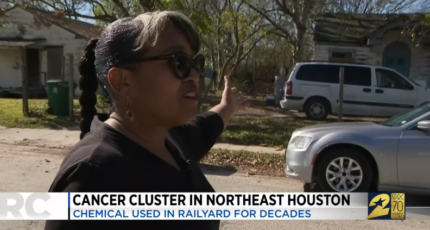
Dakota Access Pipeline protesters, many of them U.S. military veterans. Image courtesy of Reuters.
With the Dakota Access Pipeline battle seemingly behind them, veterans and local activists who rallied at North Dakota’s Standing Rock have now focused their attention on another environmental mess that has all but disappeared from the headlines: the Flint water crisis.
According to MLive, Standing Rock activists said their fight isn’t finished, as they plan on heading to Flint, Michigan, a city crippled by widespread water contamination since April 2014. To this day, city residents are forced to rely on bottled water and water filters for daily tasks like cooking and bathing.
“We don’t know when we are going to be there, but we will be heading to Flint,” U.S. Army veteran Wes Clark Jr., who helped organize about 2,000 veterans who joined the fight at Standing Rock, told the website. “This problem is all over the county. It’s got to be more than veterans. People have been treated wrong in this county for a long time.”
The protesters’ decision to head to Flint comes just two days after the U.S. Army Corps of Engineers announced that it would not approve the easement allowing the Dakota Access Pipeline to cross under Lake Oahe in North Dakota, thus halting construction of the $3.8-billion project.
Sioux tribal members and activists from around the country protested the controversial oil pipeline for months, fearing that a potential spill or rupture would contaminate their water supply. The proposed pipeline also would run less than a mile from sacred tribal lands on the reservation.
The Army said it would explore alternate routes for the 1,172-mile Dakota Access Pipeline crossing, signaling victory for Standing Rock activists who had spent the past few months fighting the pipeline’s construction. The celebration could be short-lived, however, as president-elect Trump, who has a stake in the controversial pipeline, could reverse the Army’s decision once he takes office.
“That’s something that we support construction of and we’ll review the full situation when we’re in the White House and make the appropriate determination at that time,” a Trump spokesman said at a transition team news briefing this week.
Despite the threat of invalidation at Standing Rock, demonstrators said it’s now time to set their sights on Flint, whose water crisis stretches back more than two years.
“These are people who have been just as oppressed and in some other forms, more oppressed, than Black folks,” said George F. Grundy II, a Flint resident and U.S. veteran who traveled to Standing Rock this month to show his support. “[So] to hear these people speak the name of Flint and know that Flint is in duress, too, and say that we are in their prayers, that just does a lot to me.
“It just shows me that the human spirit is larger than any corporate entity and you can believe in your fellow person because it’s worth it.”
MLive reported that an estimated 4,500 veterans, including Clark and Grundy, traveled to Standing Rock to support the protest. Now, they are hoping to take their efforts up North, where community activist Jay Ponti said impetus to combat Flint’s water crisis has slowed, as the public health disaster failed to stay relevant in the daily news cycle.
“The flow of information is very low because the media has been concerned with covering … the presidential election,” said Ponti, who plans to travel to Flint to help with the water crisis. “It’s a great disservice. You cannot have a healthy democracy if the citizens are not informed.”
“When there is no information … the citizens cannot make decisions,” he continued. “Our people are suffering. They are suffering in Standing Rock. They are suffering in Flint. They are suffering in Louisiana.”
Just last month, the Michigan state government fought a court-ordered mandate requiring bottled-water deliveries to Flint homes without verified water filters, making it that much harder for residents to get their hands on safe, clean water, Atlanta Black Star reported.
“People can’t drink water in Flint, Michigan,” Ponti stold MLive. “They can’t take baths. They are poisoned. They are spending more money on propaganda instead of fixing pipes.”


